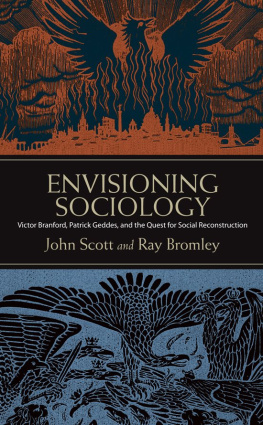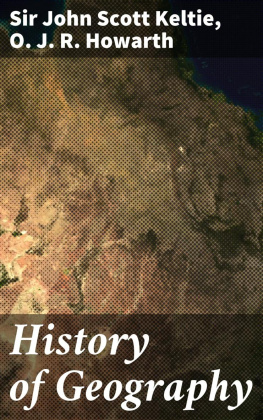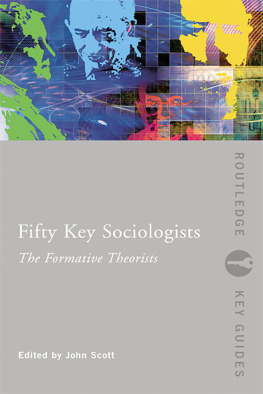Emerald Guides to Social Thought
Series Editor: John Scott
The Emerald Guides to Social Thought are a series of student-oriented guides to major thinkers on social issues.
Each book is an authoritative primer that takes the reader through the key ideas of a thinker in order to provide a firm foundation for an independent reading of primary texts, for engagement with the secondary literature, and for reading contemporary extensions and elaborations of those ideas. The Guides demonstrate the mind of the theorist at work by tracing the development of that thought through successive texts or by elucidating the various topics to which they have been applied.
Emerald Guides place the work of a thinker in the context of her or his life and times. Substantive and comprehensive chapters on key issues are followed by full guides to sources of information and translation that provide a clear map of the thinkers intellectual development, and to major items of commentary, debate, and application of their ideas.
The Guides are uniquely authoritative and accessible and provide the foundations of a scholarly library that allow the reader to develop his or her own ideas regarding influential thinkers and theorists.
Emerald Publishing Limited
Howard House, Wagon Lane, Bingley BD16 1WA, UK
First edition 2019
Copyright 2019 John Scott. Published under an exclusive licence.
Reprints and permissions service
Contact:
No part of this book may be reproduced, stored in a retrieval system, transmitted in any form or by any means electronic, mechanical, photocopying, recording or otherwise without either the prior written permission of the publisher or a licence permitting restricted copying issued in the UK by The Copyright Licensing Agency and in the USA by The Copyright Clearance Center. Any opinions expressed in the chapters are those of the authors. Whilst Emerald makes every effort to ensure the quality and accuracy of its content, Emerald makes no representation implied or otherwise, as to the chapters suitability and application and disclaims any warranties, express or implied, to their use.
British Library Cataloguing in Publication Data
A catalogue record for this book is available from the British Library
ISBN: 978-1-78769-192-6 (Print)
ISBN: 978-1-78769-189-6 (Online)
ISBN: 978-1-78769-191-9 (Epub)
CHAPTER 1
WEBER IN CONTEXT
Max Weber has been claimed by many disciplines as their pioneer, founder, or key contributor. He has been variously described as a sociologist, an economic historian, or a political theorist, and he has been seen as an important contributor to central concerns in such areas as legal studies, religious history, and the study of education. This diversity of claims is matched by Webers own reluctance to identify with any particular discipline. He held university posts in economics and in social studies, but spent large periods of his life as an independent scholar with no disciplinary or institutional affiliation. He was, for a time, a member of the German Sociological Society, helping to organise its attempts to establish sociological study and research, but he was ambivalent in his commitment and eventually gave up his membership. Although he came to describe his final academic publication as his sociology, he regarded this simply as one part of his wider intellectual concerns.
His work was, indeed, wide-ranging. He wrote on Roman history, Chinese religion, political democracy, Western musical harmony, agrarian property, Indian caste systems, forms of legal partnership, the operation of stock exchanges, the Russian revolutions, and many other matters. His particular concern throughout his life was to understand the origins and distinctive features of modern, Western societies in all their complexity and to contrast this with an understanding of the development of oriental societies. He is, perhaps, best regarded simply as writing in social science, the branch of intellectual endeavour for which he devised a solid methodological foundation. This designation allows him to be claimed by all who wish to learn from his achievements, and it allows those achievements to be seen in an interdisciplinary context that accords with contemporary developments in academic life.
The influences on Webers work were as diverse as his own writings. Throughout the eighteenth and nineteenth centuries, German intellectual life was sustained and disseminated by an academically trained body of state officials, church ministers, lawyers, and, above all, university professors, who regarded themselves as a cultivated elite able to contribute to the highest aspects of human existence through their cultural activities. The basis of their shared worldview was the idealist philosophy and social theory that had been derived from Immanuel Kants philosophy by Georg Hegel, Gottlieb Fichte, Friedrich von Schiller, and Friedrich Schelling. At the heart of this idealist system of thought was the claim that the categories, meanings, and values that are the essential conditions for human knowledge are not simply subjective properties of individual minds but are objectively real and valid. These ideas are logically necessary in order for there to be any knowledge at all and so had to be seen as something more than simply an individuals subjective preference or point of view. This led to the claim that they exist as aspects of the objective mind or objective spirit, a view that could all-too-easily be given a religious or metaphysical interpretation as forming a national spirit or soul.
Idealism became the organising principle for the foundation in 1870 of the University of Berlin by Wilhelm von Humboldt, himself a contributor to the development and articulation of many of its key tenets. The University, with a Philosophy Faculty at its centre, became the model for all subsequent new universities and university reforms.
These were the intellectual influences that shaped Webers family background and his early academic career in the final decades of the nineteenth century as Germany experienced a period of rapid social change. A strong and influential university-trained intellectual bourgeoisie existed alongside a weak economic bourgeoisie that had emerged with the slow German industrial growth of the eighteenth and early nineteenth centuries. This class was politically weak, control over state power being monopolised by the landowning Junker class. From around 1870, a much more rapid industrialisation had begun and there was a growth in large-scale undertakings, resulting in social dislocations as well as economic advances. This new bourgeois class of large financiers and industrialists became more influential in government and the state administration, where they asserted their particular economic interests.
Weber was one of the generation of German intellectuals who felt that the consequences of economic growth were threatening the values that lay at the heart of German culture. Many of these intellectuals took a rather conservative view of German culture and allied themselves with the Junkers in opposition to the power of the large capitalists. Their self-doubt about classical liberal principles led them to support the centrist and interventionist policies of the
















